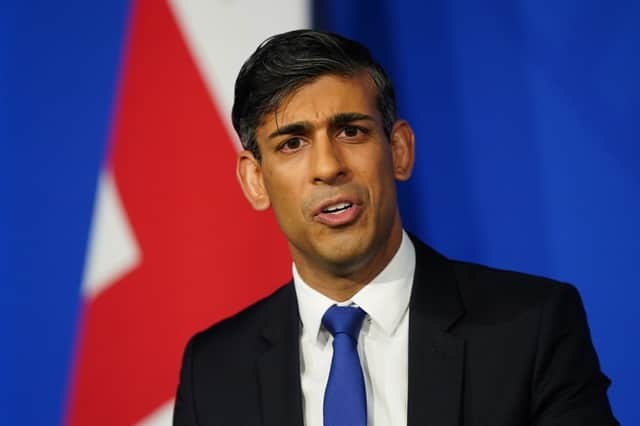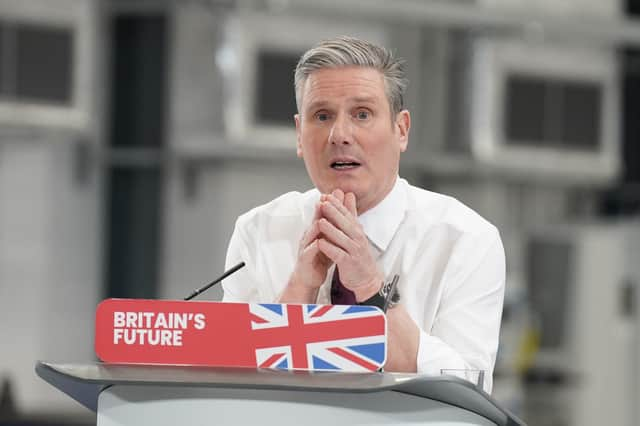When is the next general election? Rishi Sunak appears to rule out May vote - what did he say?
and live on Freeview channel 276
Rishi Sunak has dropped a major hint about when the next general election will be.
The Prime Minister gets to decide when voters go to the polls, and he has until January 2025 to call an election. There has been much speculation about when the next vote will be.
Advertisement
Hide AdAdvertisement
Hide AdLabour has been working towards the assumption that there will be a general election in May, to tie in with the local and mayoral votes. This was given more credence by the fact the government has brought its second national insurance cut to the start of April and Jeremy Hunt gave an early Budget on 6 March.
In January, a new mega-poll found that 61% of people wanted an early election by at least May. However, Sunak has twice indicated that the election could be later.


When is the next general election?
The official date of the next general election has not yet been announced, however the maximum term of a Parliament is five years from the day on which it first met. The current Parliament met on 17 December 2019, which means it will automatically dissolve on 17 December 2024.
Polling day would be expected to take place 25 days later, not counting any weekends or bank holidays that fall within that period. The latest possible polling date for the next UK general election is 24 January 2025. As Prime Minister, Rishi Sunak has the power to call the next election although it is thought unlikely that he would call one in January, as poor weather may put voters off.
Advertisement
Hide AdAdvertisement
Hide AdIn January, the Prime Minister gave a big hint as to when he will call the next election. He said: “So, my working assumption is we’ll have a general election in the second half of this year and in the meantime I’ve got lots that I want to get on with.”
Pressed if he could rule out a May election, he repeated it is his “working assumption” that the vote will be held later in the year. “I want to keep going, managing the economy well and cutting people’s taxes. But I also want to keep tackling illegal migration,” he said. “So, I’ve got lots to get on with and I’m determined to keep delivering for the British people.”
And more recently, yesterday (14 March) Sunak appeared to rule out a May poll. He told ITV News West Country "there's not going to be a general election on" the day of the local elections. The PM said: "In seven weeks' time we have local elections, including in Gloucester where I was talking to them today. We have police and crime commissioner elections, we have mayoral elections.
"I'm squarely focused on those because they're important and there's not going to be a General Election on that day. But when there is a general election actually what matters is the choice at that election." When pressed, Sunak said: "There won't be an election on that day but when there is a general election what matters is the choice - the choice is really clear because our plans are working."
Advertisement
Hide AdAdvertisement
Hide AdGeneral elections have traditionally been held in May, to coincide with local elections, or June, when the weather is better. The idea is that more people are likely to vote when its warmer and the evenings are long.
The last election in December 2019 was unusual, with Boris Johnson calling a snap election not long after replacing Theresa May. That gives until January 2025 for Sunak to hold a vote.
There had been some speculation that the PM may call an election in May, and I've been told even Tory MPs are alive to this. The thinking behind this was that the longer Sunak leaves it, the more homeowners will need to re-mortgage and blame their new higher monthly payments on the Conservatives.
I always thought this was pretty unlikely even before Sunak's latest comments, and have been planning for an October or November poll. The economy is slowly improving, inflation is coming down and lenders have been dropping rates this year. Sunak has only been in No10 for just over a year, from a personal perspective he'll want to be Prime Minister for as long as possible. He also brought David Cameron in from the cold, who was unlikely to agree to come back as Foreign Secretary for a few months.
Tactically it makes sense as well. A lot can happen in politics in seven months, and you want to give yourself as much opportunity for some unknown factor to potentially affect Labour. The government has reportedly been advised not to hold it in the same week as the US presidential election on 4 November, so my bet is a week or two before or after.
In an interview with Sky News' Beth Rigby, Sir Keir Starmer said he wanted "an election as soon as possible", adding: "I think the vast majority of the public want to see an election as soon as possible, and the reason is that the choice now is to turn our back on 14 years of decline and usher in a decade of national renewal with hope and change."
The Labour leader said his party is "ready for an election". He told Sky: "People are crying out for change. And I say to the prime minister, what’s he hiding? If he's not going to set a date, what’s he hiding from the public? This has serious implications for the country because he's basically saying he's going to be squatting for months and months in Downing Street, dithering and delaying."


Voters want snap election by May at latest
A new mega-poll of more than 10,000 people has found a majority of voters want an election by May at the latest. The survey, carried out by Focaldata on behalf of Best for Britain, revealed that 61% of respondents want a poll by the spring and 36% demanded an election as soon as possible.
Only 17% think the Prime Minister should wait until the autumn with fewer than one in 10 in favour of waiting until the last possible moment in January 2025. When asked who would make the best Prime Minister, Starmer came top in 390 constituencies with Sunak only favoured in four. There is some hope for the PM as 238 had don't know as the biggest response.
Advertisement
Hide AdAdvertisement
Hide AdNaomi Smith, chief executive of Best for Britain, said: “The message in our polling from voters is clear - they want an election, they think Brexit has hurt them in their pockets, and they’re prepared to vote tactically for change. Labour may be on course for a victory, but under our broken electoral system nothing can be taken for granted."
While Labour's Pat McFadden said: "All we have learned today is that our unelected Prime Minister has yet again bottled holding the election. He needs to stop hiding, stop being so weak, stop squatting in Number 10 without a mandate and simply come clean with the public: when will the British people get their say on 14 years of Tory failure?
“Even now Rishi Sunak is still leaving himself as much wiggle room as possible. But the reality is clear: the only thing worse than five more months of this Tory government would be five more years. This can be the year of change. The power to end Tory drift and decline and begin national renewal with Labour lies with the voters. The sooner they get their say the better."
Ralph Blackburn is NationalWorld’s politics editor based in Westminster, where he gets special access to Parliament, MPs and government briefings. If you liked this article you can follow Ralph on X (Twitter) here and sign up to his free weekly newsletter Politics Uncovered, which brings you the latest analysis and gossip from Westminster every Sunday morning.
Comment Guidelines
National World encourages reader discussion on our stories. User feedback, insights and back-and-forth exchanges add a rich layer of context to reporting. Please review our Community Guidelines before commenting.
